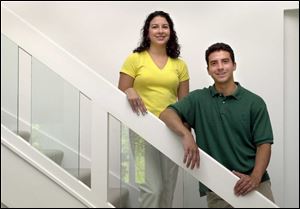
Private consultants offer college advice for a price
8/12/2002
`I just felt like I needed someone with more expertise and someone who could point me in the right direction with what I wanted,' says Kelly Salinas, at home with her brother, Paul.
For Eileen Salinas, it was a matter of personal attention.
Like a growing number of parents looking for an edge on getting their children into competitive colleges, the mother of three from Lima, Ohio, chose to seek guidance from an educational consultant.
Tired of relying solely on school guidance counselors who often must juggle hundreds of students, proponents say these hired guns offer expert attention and a leg up at selective schools - at a price.
Others caution that consultants can be expensive and provide parental comfort but little real advantage.
All three of Mrs. Salinas' children looked to private consultants before eventually packing their bags for college, seeking advice about everything from matching up with the right school to literally crossing the “t”s and dotting the “i”s of the essay.
Daughter Kelly, 23, who attended Denison University as an undergraduate and who now is in medical school at Ohio University, said she was overwhelmed at first with the number of choices involved with choosing a college.
“I just felt like I needed someone with more expertise and someone who could point me in the right direction with what I wanted,” she said. “[The counselor] was so in tune with what they were looking for, what was going to get you in.”
Such services are not without cost. Fees typically range from about $700 to $2,400, though Mark Sklarow, executive director of the Independent Educational Consultants Association, has seen prices over $10,000. Still, the proliferation of consultants - IECA membership has doubled to 350 in the last six years - suggests the market for their services is growing.
Last year, there were 1,400 applicants for membership in the Virginia-based association, which requires three years of experience, visits to 75 schools, and 50 clients, Mr. Sklarow said. He credits increased interest in the field to guidance counselors at many high schools who are overworked, each dealing with an average of 600 students nationally.
Larger high school graduating classes, a growing emphasis on college selectivity, and more two-parent working families with expendable income and less free time to assist in a college search feed the trend as well, he said.
The use of independent counselors long has been big on both coasts, but only recently has it trickled into the Midwest, according to Paul Deutsch, director of admissions at Kent State University and president of the Ohio Association for College Admission Counseling.
Only a handful of independent counselors in Ohio, and even fewer in Michigan, are part of the national association. “We don't have a whole lot of highly selective colleges here in the state,” Mr. Deutsch said. “I think the more affluent family looking at Ivy League-type schools are those most likely to look at this.”
Arline H. Altman, an independent educational consultant in Columbus, has been in the business for 25 years. A former high school teacher, she said she works with all kinds of students.
For the stronger ones, there is help finding the right college, preparing for college interviews and perfecting college essays, reviewing drafts and answering strategic questions like “Do you write with intensity or do you write with humor.” Weaker students can receive help with study habits.
Typically, she meets with clients a half-dozen times and keeps in weekly contact with them via e-mail and fax. Often these sessions begin in the spring or summer of a student's junior year, though some start planning earlier.
While a number of area high school guidance counselors mention this alternative to students, few reported knowing more than a couple who gave private consultants the old college try.
“Most of the information they need and can take advantage of, we can offer through the schools,” said Tim Reiser, a guidance counselor at Springfield High School.
“We've got a lot of things coming at us. It is tough to balance,” he admitted. “But I think we put more of our focus on juniors and seniors trying to prepare them for college, workforce, or military or whatever their path is going to be.”
Others worry that there could even be some negative ramifications in hiring help.
“College are very savvy. They don't want a packaged kid. They don't want a kid who looks like he's been put together and marketed,” said Marybeth Kravets, a high school counselor near Chicago who is past president of the National Association for College Admission Counseling.
In the end, though, for people like Kelly Salinas and her siblings, its value can be as simple as providing a sense of security.
“I think it gives you confidence in the choices you're making,” Ms. Salinas said. “I was definitely very prepared.”